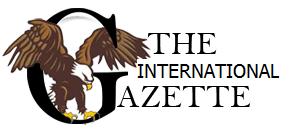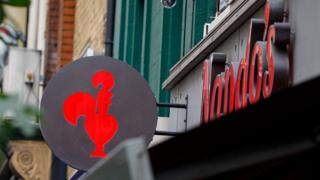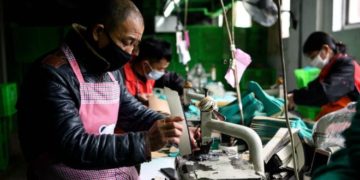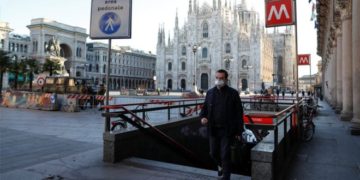Italy was the first European country to report a major surge in cases of the coronavirus, with numbers quickly climbing into the hundreds.
The authorities have responded with travel restrictions in the north of the country that are bound to hit the economy.
So far, a number of towns in Lombardy in northern Italy have been locked down, with very limited numbers of people being allowed in or out.
That matters, because northern Italy is the country’s industrial powerhouse. Lombardy alone accounts for 40% of Italian industrial output. Milan is Italy’s key centre for finance and a range of other services.
Milan is not one of the areas covered by the shutdown. But even so, major tourist and cultural sites such as the cathedral (the Duomo) and the opera house La Scala have been closed.
Milan is also one of the world’s major fashion centres. Fashion Week in late February did survive – after a fashion, as it were – but it was affected. For instance, Giorgio Armani’s collection was shown without an audience.
Had the coronavirus arrived a few weeks earlier, it seems likely there would have been much more disruption to this major event in Milan’s calendar.
There is some debate about whether the response in Lombardy has been too aggressive. But it is certainly true that public perceptions, well founded or not, translate into decisions about whether to travel or go out that have a real impact on businesses.
Persistent problem
Italy has struggled with persistently slow growth for many years. So could this health crisis be the factor that tips the country into another recession?
By any measure, the Italian economy is in a bad way.
In 2019, total production of goods and services was approximately the same as it was 15 years earlier. What’s more, it was still 4% below the level it reached in 2007, just before the financial crisis.
Unemployment is also a persistent problem, especially among young people. The unemployment rate among under-25s is 28.9%, with only Spain and Greece having higher figures in the EU.
In the last two years, Italy has also had to contend with weaker global growth and a slowdown in international trade. In the final quarter of last year, GDP fell by 0.3%.
Prof Roberto Perotti of Bocconi University in Milan says more of the same is now in prospect:
“GDP will almost certainly shrink this quarter as well, so Italy will technically be in a recession [often defined as two consecutive quarters of declining GDP]. It will probably shrink for the whole year,” he says.
Tourism woes
It is true that even without the virus, another contraction in the current quarter would have been a distinct possibility. But the odds have strengthened now that economic activity will be hit by the health crisis.
How severe it will be for Italy obviously depends on the unknowable (at this stage) course of the disease.










































Discussion about this post